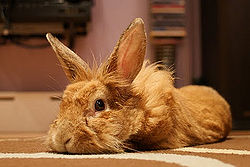Rabbits
From Comparative Physiology of Vision
| Rabbit | |
|---|---|
 |
|
| Scientific classification | |
| Kingdom: | Animalia |
| Superphylum: | Chordata |
| Phylum: | Vertebrata |
| Class: | Mammalia |
| Order: | Lagomorpha |
| Family: | Leporidae in part |
Contents |
General Anatomy
Unique Visual Optics
Photo Transduction
Color Vision
Motion Detection
Neuronal Processing
Higher Order Visual Perception
Evolutionary Significance
Some Notes
latin name for domestic rabbit Oryctolagus cuniculus. rabbits have a third eyelid called the nictitating membrane that moves across the cornea Rabbits have eyes located high on the sides of the head, which allows for almost complete 360 degree vision, but creates a blind spot directly in front of their face[1].
Rabbits can see almost 360 degrees around, and over it's head. not very good at discerning color. They have a blind spot right in front of their face due to their farsightedness. Owners often place food directly in front of their rabbits face a are confused as to why their pet can't find it. Rabbits can perceive the difference between green and blue. There are some studies done in the seventies that have "proved it". "The rabbit retina has a much higher ratio of rods to cones than the human retina has. Although a rabbit can see better than a human in low light conditions, his low light image has much poorer resolution (clarity) than the daytime images formed by your cone-rich, primate retina. "[2].
